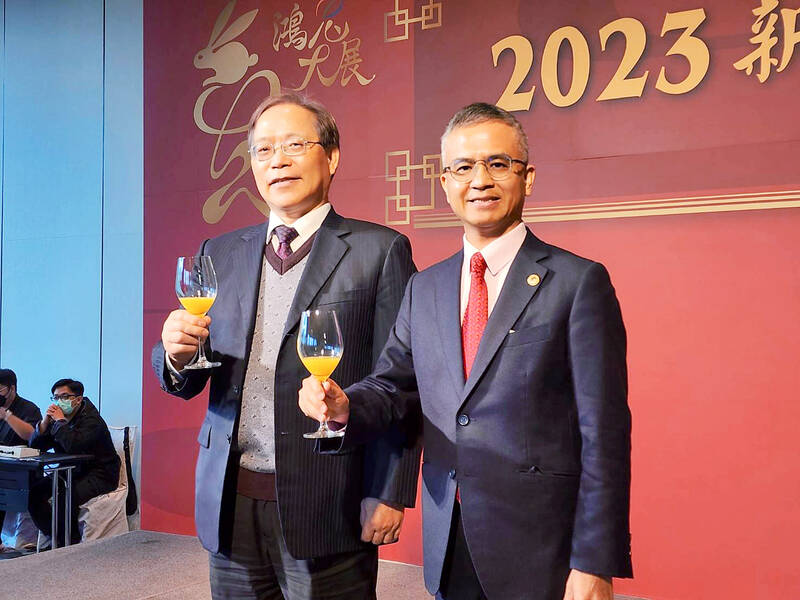Chunghwa Telecom Co (中華電信) aims to boost its 5G penetration rate by 10 percentage points to about 35 percent this year, amid demand from government agencies and enterprise clients for high-speed Internet connections and private networks, the company said yesterday.
Chunghwa, the nation’s biggest telecom, had accumulated 2.45 million 5G subscribers as of the end of last year, accounting for about 25 percent of its overall mobile users, data compiled by the National Communications Commission showed.
“We expect 5G subscription to grow at a similar pace as last year,” Chunghwa Telecom chairman Sheih Chi-mau (謝繼茂) told a news conference in Taipei.

Photo: CNA
Chunghwa Telecom said that government agencies and industrial users are the early adopters of 5G networks, followed by individual subscribers, which is starkly different from the uptake of 4G.
It has made good progress in helping enterprise clients build private 5G networks, obtaining 90 percent of the deals among the nation’s large-scale enterprises, it said.
Local telecoms would likely be disciplined on pricing strategy, as it would take longer to break even on 5G services compared with 4G, given the heavy infrastructure deployment and investment, Sheih said.
The companies spent 10 years making 4G services a profitable business, he said.
To stimulate 5G adoption and to satisfy demand for emerging applications, Chunghwa Telecom said it plans to add 1,700 workers this year, with 41 percent of the initial hires focused on artificial intelligence, cloud services, cybersecurity and data services.
To attract and retain talent, it is raising the starting salary for entry-level jobs to NT$40,000 (US$1,324), from about NT$37,000, it said.
Increases in human resource expenses are to eliminate about NT$0.05 from the company’s earnings per share a year, it said.
The company also set a mid-term goal of boosting revenue from three rapidly growing businesses — cloud-based services, cybersecurity and 5G-based artificial intelligence of things — to reach NT$10 billion each by 2025.

CHIP RACE: Three years of overbroad export controls drove foreign competitors to pursue their own AI chips, and ‘cost US taxpayers billions of dollars,’ Nvidia said China has figured out the US strategy for allowing it to buy Nvidia Corp’s H200s and is rejecting the artificial intelligence (AI) chip in favor of domestically developed semiconductors, White House AI adviser David Sacks said, citing news reports. US President Donald Trump on Monday said that he would allow shipments of Nvidia’s H200 chips to China, part of an administration effort backed by Sacks to challenge Chinese tech champions such as Huawei Technologies Co (華為) by bringing US competition to their home market. On Friday, Sacks signaled that he was uncertain about whether that approach would work. “They’re rejecting our chips,” Sacks

NATIONAL SECURITY: Intel’s testing of ACM tools despite US government control ‘highlights egregious gaps in US technology protection policies,’ a former official said Chipmaker Intel Corp has tested chipmaking tools this year from a toolmaker with deep roots in China and two overseas units that were targeted by US sanctions, according to two sources with direct knowledge of the matter. Intel, which fended off calls for its CEO’s resignation from US President Donald Trump in August over his alleged ties to China, got the tools from ACM Research Inc, a Fremont, California-based producer of chipmaking equipment. Two of ACM’s units, based in Shanghai and South Korea, were among a number of firms barred last year from receiving US technology over claims they have

It is challenging to build infrastructure in much of Europe. Constrained budgets and polarized politics tend to undermine long-term projects, forcing officials to react to emergencies rather than plan for the future. Not in Austria. Today, the country is to officially open its Koralmbahn tunnel, the 5.9 billion euro (US$6.9 billion) centerpiece of a groundbreaking new railway that will eventually run from Poland’s Baltic coast to the Adriatic Sea, transforming travel within Austria and positioning the Alpine nation at the forefront of logistics in Europe. “It is Austria’s biggest socio-economic experiment in over a century,” said Eric Kirschner, an economist at Graz-based Joanneum

OPTION: Uber said it could provide higher pay for batch trips, if incentives for batching is not removed entirely, as the latter would force it to pass on the costs to consumers Uber Technologies Inc yesterday warned that proposed restrictions on batching orders and minimum wages could prompt a NT$20 delivery fee increase in Taiwan, as lower efficiency would drive up costs. Uber CEO Dara Khosrowshahi made the remarks yesterday during his visit to Taiwan. He is on a multileg trip to the region, which includes stops in South Korea and Japan. His visit coincided the release last month of the Ministry of Labor’s draft bill on the delivery sector, which aims to safeguard delivery workers’ rights and improve their welfare. The ministry set the minimum pay for local food delivery drivers at